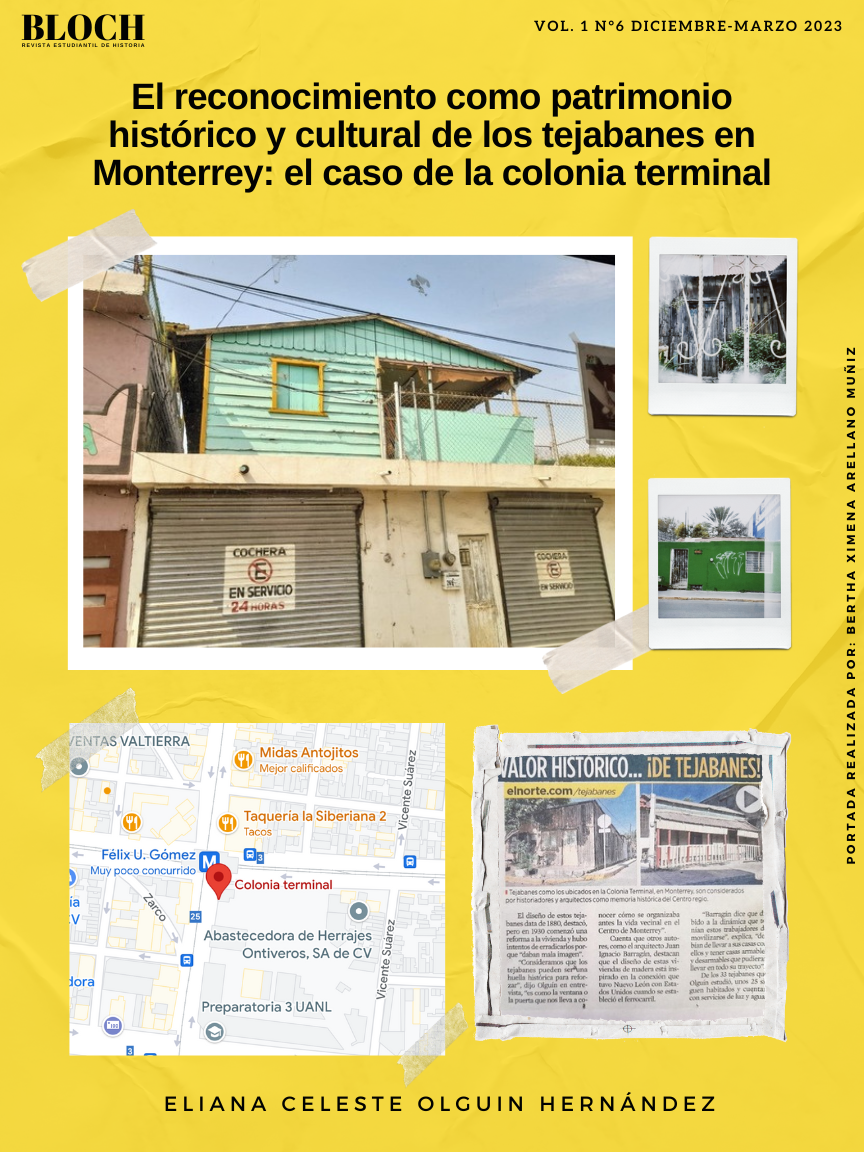Recognition as historical and cultural heritage of the Tejabans in Monterrey: the case of the terminal colony

Published 2023-09-13
Keywords
- Tejaban,
- Historical heritage,
- Identity
How to Cite
Copyright (c) 2023 Eliana Celeste Olguin Hernández

This work is licensed under a Creative Commons Attribution 4.0 International License.
Abstract
At the beginning of the 20th century, in Monterrey, located in northeastern Mexico, an authentic housing typology was developed, known as tejabán. As a result of the immediate need for housing spaces for residents attracted by the installation of the industry. In this context, the tejabán was an important element during the urban-housing extension that began to the north of the first square. However, after the disproportionate growth of the city, those residential areas that were initially considered peripheral were imprisoned by the center. For this reason, these dwellings faced factors that hindered their presence and preservation through the substitution of materials, landscape regeneration, and urban regulations. Despite these conditions, the practice of self-building tejabanes continued to be replicated in different city areas until the end of the 20th century. After this trajectory, the memory of living in a tejabán acquired great importance because some users deposited their own history, esteem, and symbols linked to identity in these constructions. The objective of this work will be to analyze the historical resignification of the tejabán, exposing the reasons why it could be considered a heritage object in Monterrey. The data will be obtained from documentary sources and in-depth interviews, through a historical-analytical and qualitative method. This research allows us to reflect on the contribution of the masses in the history and construction of identity for the region.
Downloads
References
- Barragán, Juan. 100 años de vivienda en México: historia de la vivienda en una óptica económica y social. Monterrey: Urbis Internacional, 1996.
- Camacho, Lidia, Patrimonio cultural, historia y memoria. En Camilo Contreras (coord.). Ladrillos, fierros y memoria: teoría y gestión del patrimonio industrial. 23-38. Tijuana: Colegio de la Frontera Norte, 2015.
- Casas, Juan, Imaginarios interrumpidos: ensayo sobre patrimonio inmueble perdido en Monterrey. Monterrey: CONARTE, Fondo editorial Monterrey, 2015.
- CONARTE La ruta del adobe y el sillar. Un viaje a través de los materiales de la arquitectura vernácula de Nuevo León. Monterrey: CONARTE, Los autores, 2017.
- El Colef. (2019) Reporte Barrio CONARTE. Monterrey: CONARTE
- Flores, Oscar, Monterrey origen y destino. Monterrey: Municipio de Monterrey, 2009.
- Garza, G. Calzada Madero ¿Quién te quiere? Sabinas Hidalgo: Ediciones Minas Viejas,
- Guadalupe Hidalgo, comentario sobre los tejabanes, 25 de julio 2022.
- https://www.facebook.com/Restaurika/posts/pfbid08H9AUVJwnsJ8jCLrVJFde4rW5azjyNMHDuyQztb1ovHd6TPZR3eekjKg4LK9CY7
- Holley-Kline, S. El patrimonio industrial negativo afectaciones y usos de infraestructura
- petrolera al norte de Veracruz. En Gámez, M., Núñez, A. (coord.). Y se detuvieron las maquinas, lenguajes, reconversión y espacios simbólicos del patrimonio industrial. El colegio de San Luis: San Luis Potosí, 2020.
- Jurado, Mario., Contreras, Camilo., Sánchez, Isabel., Vázquez, Gustavo. (2022) Cohesión
- barrial en Monterrey. Interacciones socio territoriales en las colonias Sarabia, Treviño, Terminal y Obrerista. Region y Sociedad, 34. (2022): 1-25. doi: 10.22198/rys2022/34/1509.
- Loredo, Eduardo “El imaginario urbano del barrio San Luisito: Imagen y memoria del espacio vivido en los tejabanes”. Tesis de maestría, Universidad Autónoma de Nuevo León, 2013.
- Montemayor, Andrés. Historia de Monterrey. Monterrey: Asociación de Editores y Libreros
- de Monterrey, 1971.
- Olguin, Eliana, “Circunstancias sociales y personales en preservación de tejabanes de la
- colonia Terminal 1970: legislación y estigma”. (artículo inédito) Sillares, Revista de Estudios Históricos.
- Ortega, Luz, “Consumo de bienes culturales: reflexiones sobre un concepto y tres categorías
- para su análisis” Culturales 5(10) 14 de marzo 2009. 63.
- Palacios, Lidia. “Transformaciones en los barrios obreros: caso de la colonia Terminal”,
- editado por Camilo Contreras. Monterrey a través de sus calles, Monterrey: CONARTE, 2013
- Salinas, César. “El anhelo de un hogar. El programa de vivienda de las empresas del Grupo
- Industrial Monterrey” en Libro de Oro de la Sociedad Cuauhtémoc y Famosa. Monterrey: FAMOSA, 2018.
- Vargas, I. “La conservación del patrimonio histórico. Nuevas propuestas desde la arqueología a la luz
- de la democracia participativa y protagónica”. Boletín Antropológico 24(67), (2006): 311-334.
- Zavala, Roberto. La vivienda en la historia de Nuevo León: siglos XVII, XVIII y XIX.
- Monterrey: Instituto del Fondo Nacional de la vivienda para los trabajadores. Delegación Nuevo León, 1997.
- Zubieta, Ana, Cultura popular y cultura de masas, conceptos, recorridos y polémicas. Argentina: Paidós, 2000.
- Archivos
- Archivo Histórico Municipal de Monterrey. (AHMM) Fondo: Monterrey contemporáneo/ actas/ 10/07/1888/ actas de cabildo vol. 999 exp. 1888/033
- AHMM Fondo: Monterrey contemporáneo: Reglamento policial, 1888. Ley de construcciones nuevas en la ciudad, 1922 Ley de Desarrollo Municipal, 1927 p. 293.
- Archivo General del estado de Nuevo León (AGNL) Serie: Concesiones caja 1 exp. 9/1 1890.
- AGNL Serie: Concesiones caja 3 exp. 8/4 1890.
- AGNL Serie: Concesiones caja 2 exp. 6/2 1890.
- AGNL Serie: Concesiones caja 2 exp. 6/5 1890.
- AGNL Serie: Concesiones caja 23 exp. 7/3 1909.
- AGNL Serie: Concesiones caja 33 exp. 7 1928.
- AGNL Serie: Concesiones, 1929
- Entrevistas
- David González entrevista del proyecto Barrios CONARTE, 07 de octubre 2019. Entrevista inédita.
- Gloria Medellín entrevistada por Celeste Olguin. 9 de noviembre 2021.
- Hilda Lara entrevistada por Cortes, Francisco., y Olguin, Celeste. 24 de octubre 2021 Monterrey, México.
- Haros, Francisco. Entrevista realizada por Rangel., E., Cortes, F., Olguin C. 6 de noviembre 2021, Monterrey, México.
